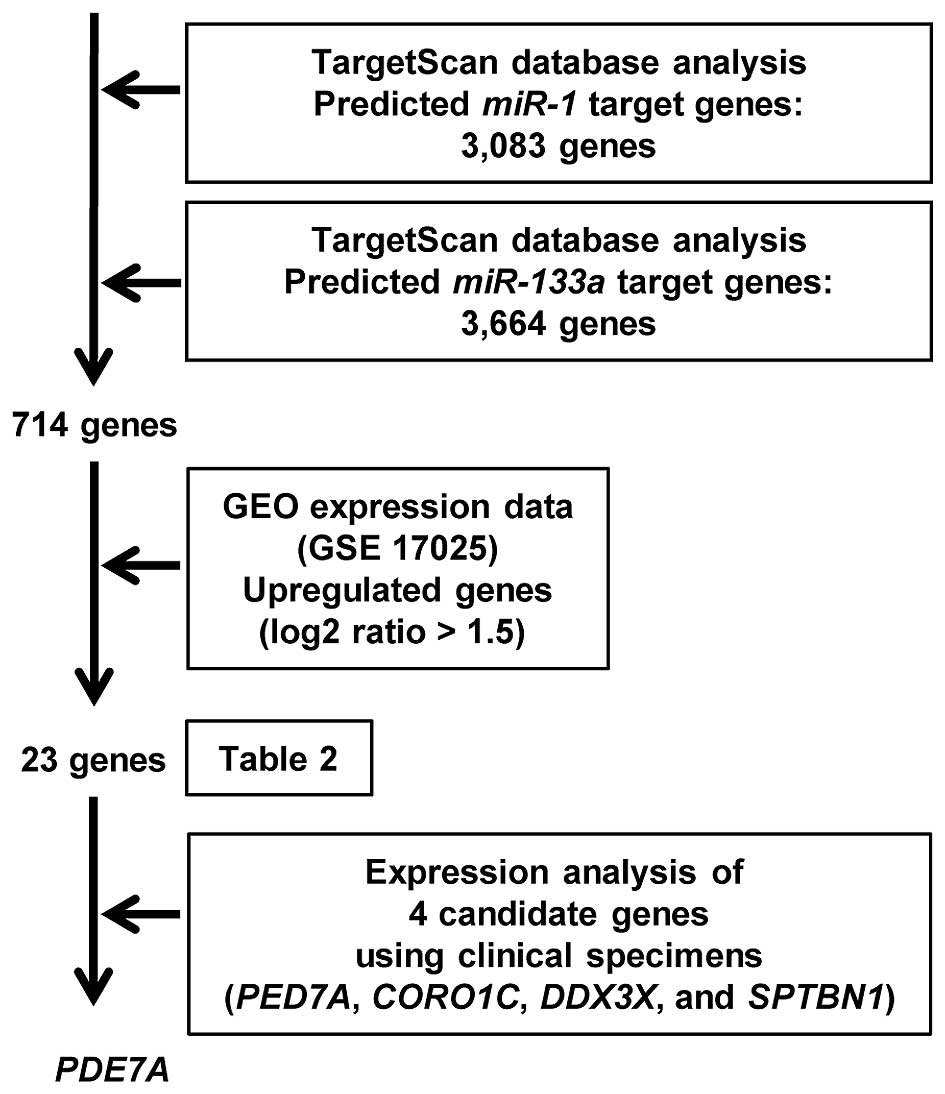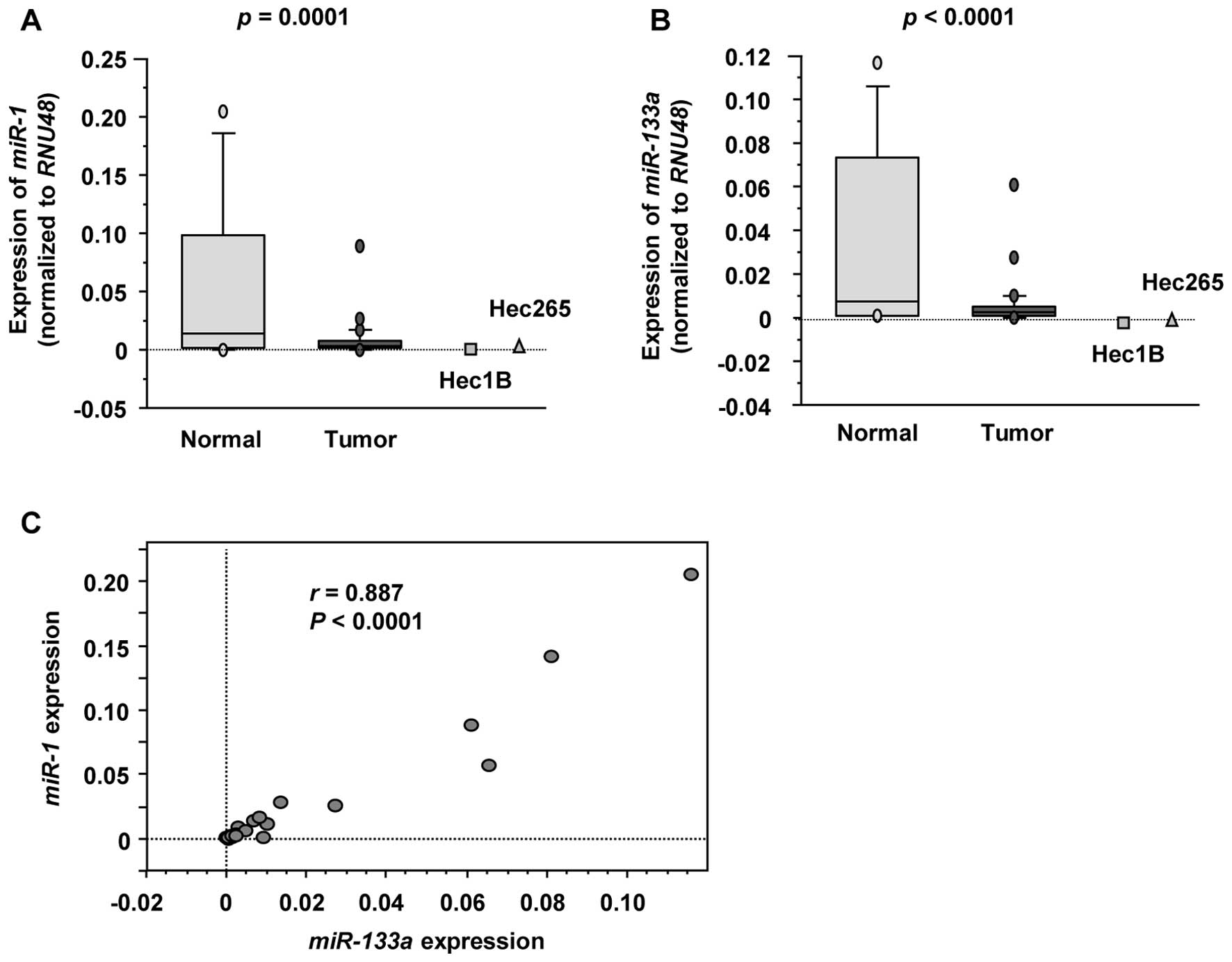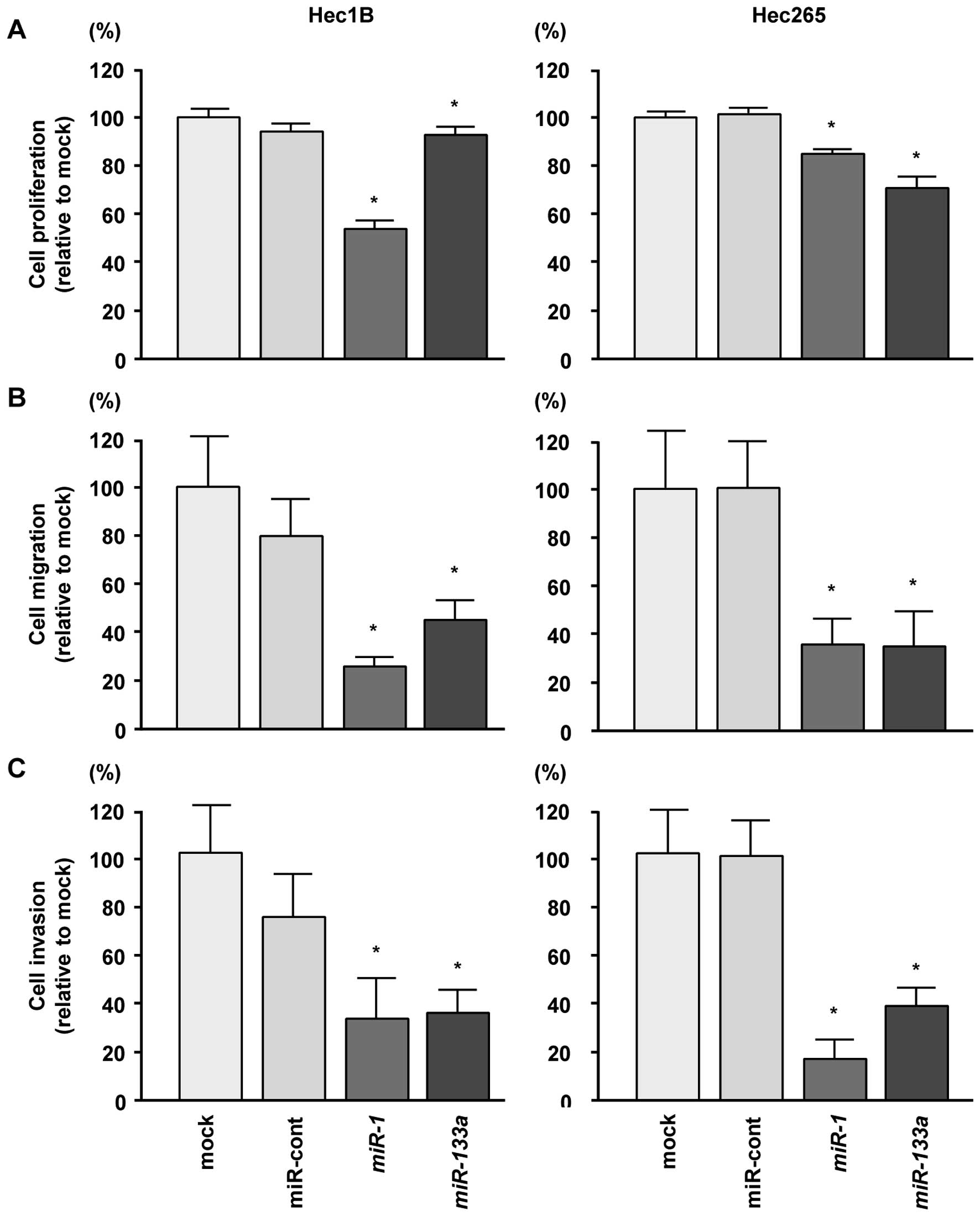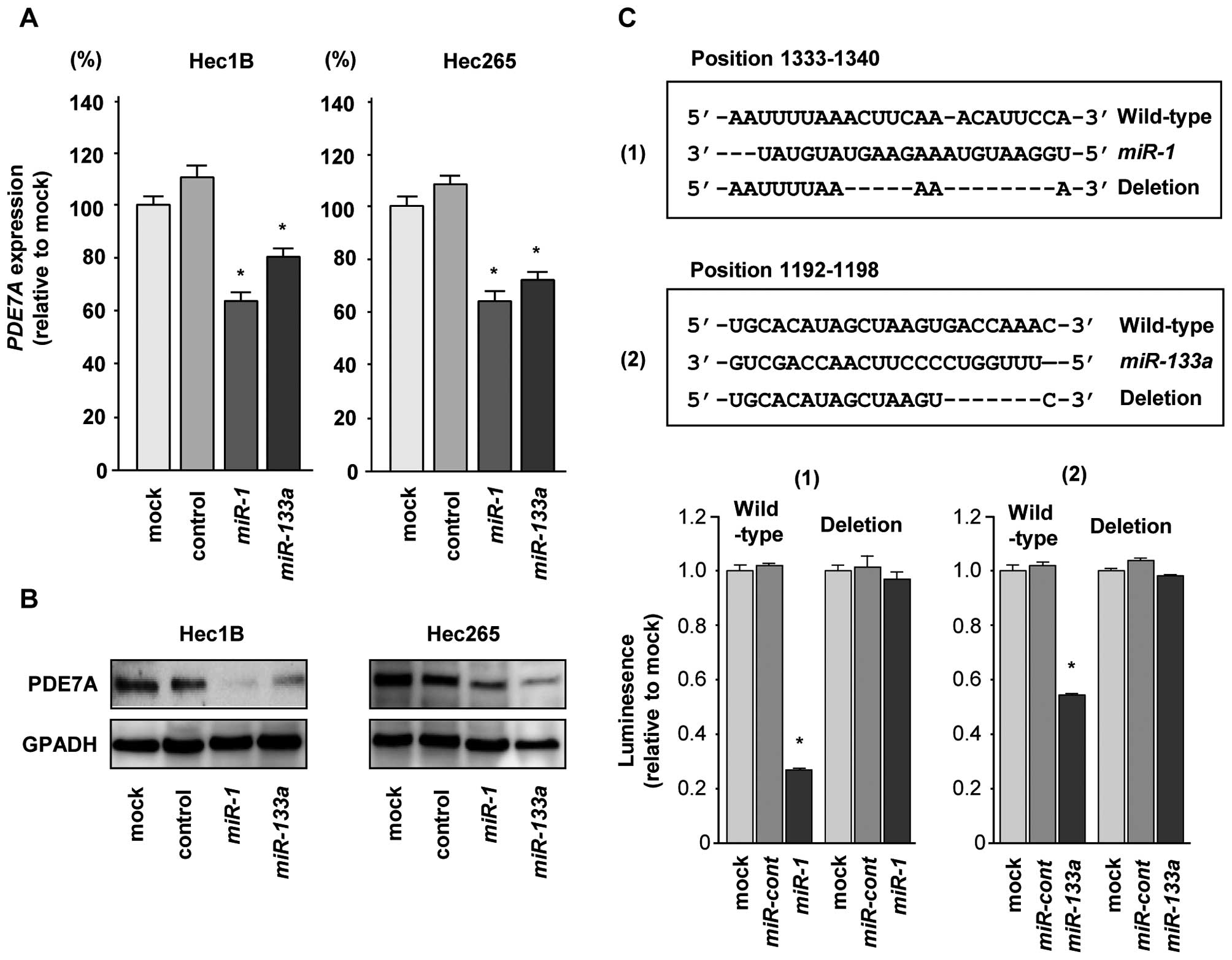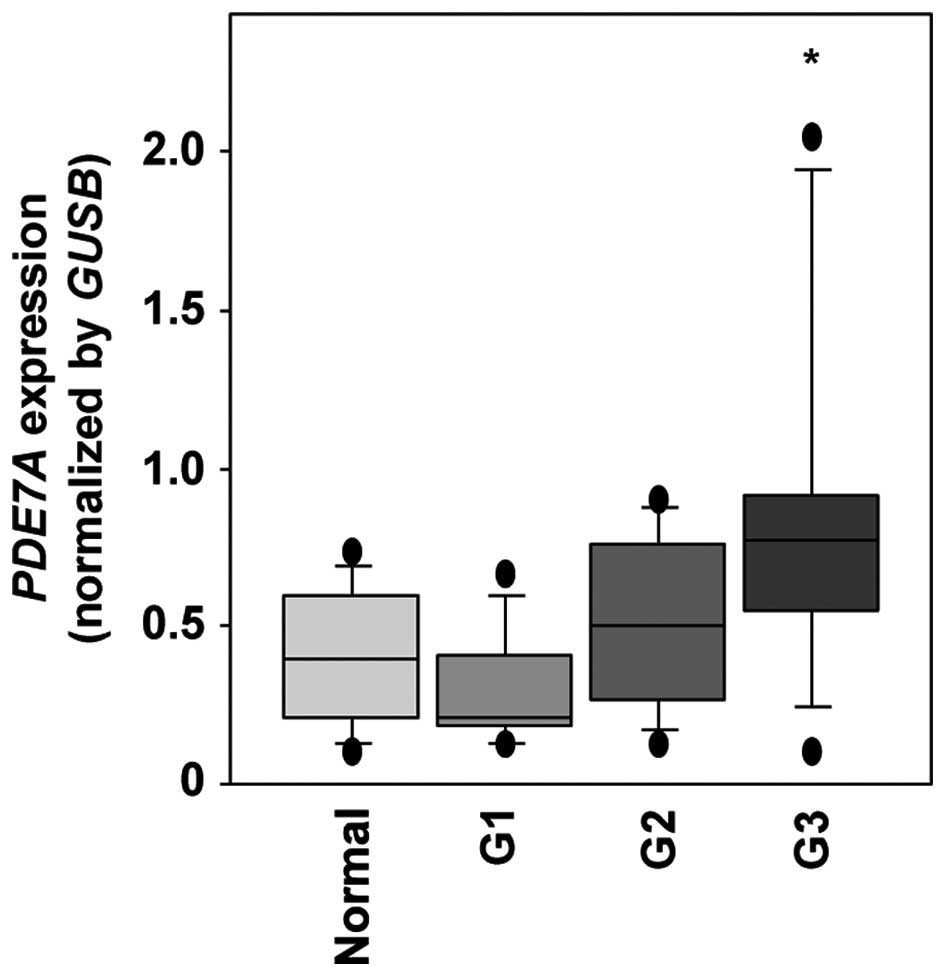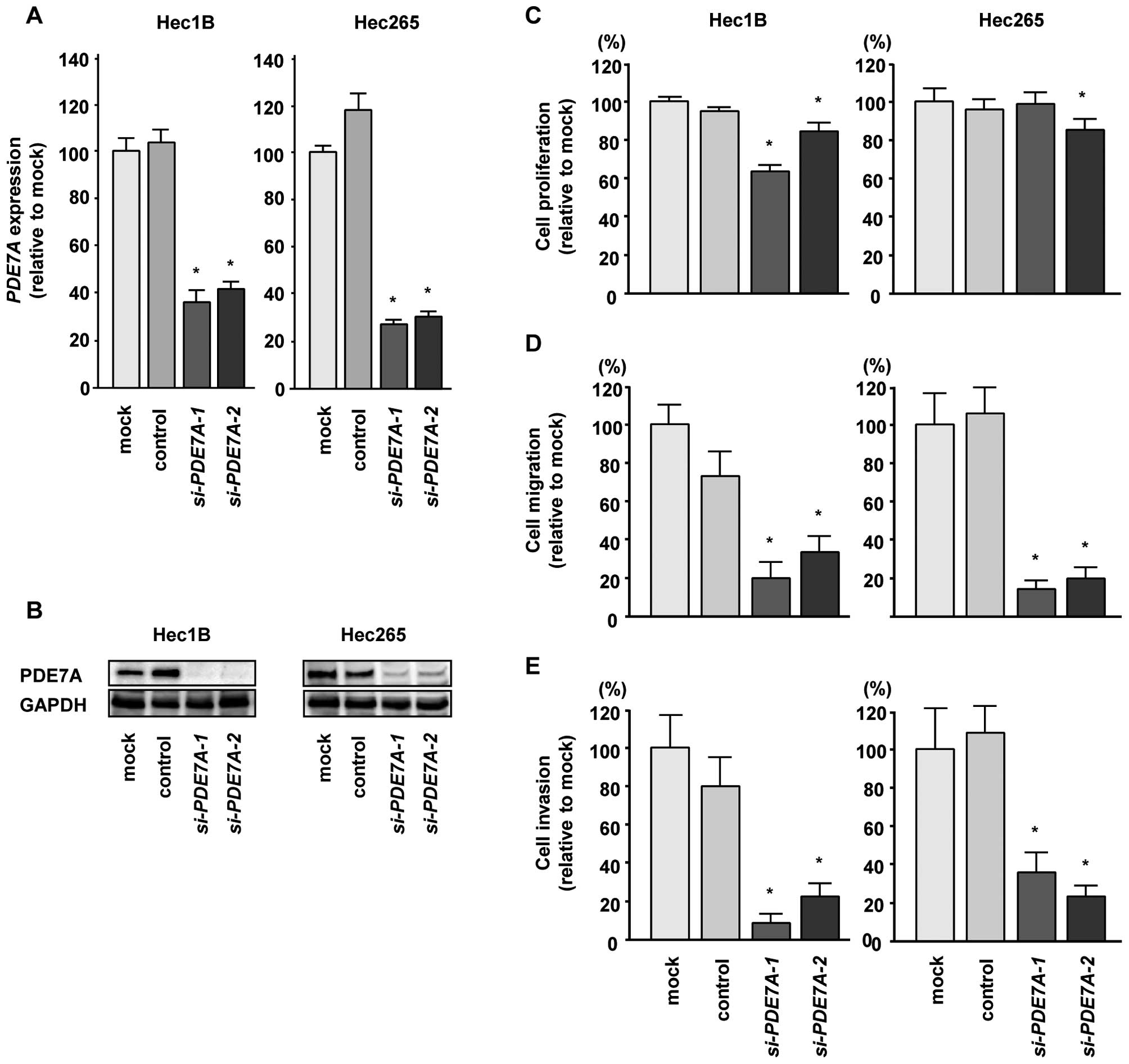|
1
|
Jemal A, Bray F, Center MM, Ferlay J, Ward
E and Forman D: Global cancer statistics. CA Cancer J Clin.
61:69–90. 2011. View Article : Google Scholar : PubMed/NCBI
|
|
2
|
Rose PG: Endometrial carcinoma. N Engl J
Med. 335:640–649. 1996. View Article : Google Scholar : PubMed/NCBI
|
|
3
|
Creasman WT, Odicino F, Maisonneuve P,
Quinn MA, Beller U, Benedet JL, Heintz AP, Ngan HY and Pecorelli S:
Carcinoma of the corpus uteri. FIGO 26th Annual Report on the
Results of Treatment in Gynecological Cancer. Int J Gynaecol
Obstet. 95(Suppl 1): S105–S143. 2006. View Article : Google Scholar : PubMed/NCBI
|
|
4
|
Murali R, Soslow RA and Weigelt B:
Classification of endometrial carcinoma: More than two types.
Lancet Oncol. 15:e268–e278. 2014. View Article : Google Scholar : PubMed/NCBI
|
|
5
|
Makker V, Hensley ML, Zhou Q, Iasonos A
and Aghajanian CA: Treatment of advanced or recurrent endometrial
carcinoma with doxorubicin in patients progressing after
paclitaxel/carboplatin: Memorial Sloan-Kettering Cancer Center
experience from 1995 to 2009. Int J Gynecol Cancer. 23:929–934.
2013. View Article : Google Scholar : PubMed/NCBI
|
|
6
|
Bartel DP: MicroRNAs: Genomics,
biogenesis, mechanism, and function. Cell. 116:281–297. 2004.
View Article : Google Scholar : PubMed/NCBI
|
|
7
|
Hobert O: Gene regulation by transcription
factors and microRNAs. Science. 319:1785–1786. 2008. View Article : Google Scholar : PubMed/NCBI
|
|
8
|
Iorio MV and Croce CM: MicroRNAs in
cancer: Small molecules with a huge impact. J Clin Oncol.
27:5848–5856. 2009. View Article : Google Scholar : PubMed/NCBI
|
|
9
|
Filipowicz W, Bhattacharyya SN and
Sonenberg N: Mechanisms of post-transcriptional regulation by
microRNAs: Are the answers in sight? Nat Rev Genet. 9:102–114.
2008. View Article : Google Scholar : PubMed/NCBI
|
|
10
|
Friedman JM and Jones PA: MicroRNAs:
Critical mediators of differentiation, development and disease.
Swiss Med Wkly. 139:466–472. 2009.PubMed/NCBI
|
|
11
|
Nohata N, Hanazawa T, Kikkawa N, Sakurai
D, Sasaki K, Chiyomaru T, Kawakami K, Yoshino H, Enokida H,
Nakagawa M, et al: Identification of novel molecular targets
regulated by tumor suppressive miR-1/miR-133a in maxillary sinus
squamous cell carcinoma. Int J Oncol. 39:1099–1107. 2011.PubMed/NCBI
|
|
12
|
Yoshino H, Chiyomaru T, Enokida H,
Kawakami K, Tatarano S, Nishiyama K, Nohata N, Seki N and Nakagawa
M: The tumour-suppressive function of miR-1 and miR-133a targeting
TAGLN2 in bladder cancer. Br J Cancer. 104:808–818. 2011.
View Article : Google Scholar : PubMed/NCBI
|
|
13
|
Kojima S, Chiyomaru T, Kawakami K, Yoshino
H, Enokida H, Nohata N, Fuse M, Ichikawa T, Naya Y, Nakagawa M, et
al: Tumour suppressors miR-1 and miR-133a target the oncogenic
function of purine nucleoside phosphorylase (PNP) in prostate
cancer. Br J Cancer. 106:405–413. 2012. View Article : Google Scholar :
|
|
14
|
Mataki H, Enokida H, Chiyomaru T, Mizuno
K, Matsushita R, Goto Y, Nishikawa R, Higashimoto I, Samukawa T,
Nakagawa M, et al: Downregulation of the microRNA-1/133a cluster
enhances cancer cell migration and invasion in lung-squamous cell
carcinoma via regulation of Coronin1C. J Hum Genet. 60:53–61. 2015.
View Article : Google Scholar
|
|
15
|
Berg A, Hoivik EA, Mjøs S, Holst F, Werner
HM, Tangen IL, Taylor-Weiner A, Gibson WJ, Kusonmano K, Wik E, et
al: Molecular profiling of endometrial carcinoma precursor, primary
and metastatic lesions suggests different targets for treatment in
obese compared to non-obese patients. Oncotarget. 6:1327–1339.
2015.
|
|
16
|
Banno K, Yanokura M, Kisu I, Yamagami W,
Susumu N and Aoki D: MicroRNAs in endometrial cancer. Int J Clin
Oncol. 18:186–192. 2013. View Article : Google Scholar : PubMed/NCBI
|
|
17
|
Karaayvaz M, Zhang C, Liang S, Shroyer KR
and Ju J: Prognostic significance of miR-205 in endometrial cancer.
PLoS One. 7:e351582012. View Article : Google Scholar : PubMed/NCBI
|
|
18
|
Itesako T, Seki N, Yoshino H, Chiyomaru T,
Yamasaki T, Hidaka H, Yonezawa T, Nohata N, Kinoshita T, Nakagawa
M, et al: The microRNA expression signature of bladder cancer by
deep sequencing: The functional significance of the miR-195/497
cluster. PLoS One. 9:e843112014. View Article : Google Scholar : PubMed/NCBI
|
|
19
|
Hidaka H, Seki N, Yoshino H, Yamasaki T,
Yamada Y, Nohata N, Fuse M, Nakagawa M and Enokida H: Tumor
suppressive microRNA-1285 regulates novel molecular targets:
Aberrant expression and functional significance in renal cell
carcinoma. Oncotarget. 3:44–57. 2012.PubMed/NCBI
|
|
20
|
Kinoshita T, Hanazawa T, Nohata N, Kikkawa
N, Enokida H, Yoshino H, Yamasaki T, Hidaka H, Nakagawa M, Okamoto
Y, et al: Tumor suppressive microRNA-218 inhibits cancer cell
migration and invasion through targeting laminin-332 in head and
neck squamous cell carcinoma. Oncotarget. 3:1386–1400.
2012.PubMed/NCBI
|
|
21
|
Kinoshita T, Nohata N, Hanazawa T, Kikkawa
N, Yamamoto N, Yoshino H, Itesako T, Enokida H, Nakagawa M, Okamoto
Y, et al: Tumour-suppressive microRNA-29s inhibit cancer cell
migration and invasion by targeting laminin-integrin signalling in
head and neck squamous cell carcinoma. Br J Cancer. 109:2636–2645.
2013. View Article : Google Scholar : PubMed/NCBI
|
|
22
|
Nishikawa R, Goto Y, Kojima S, Enokida H,
Chiyomaru T, Kinoshita T, Sakamoto S, Fuse M, Nakagawa M, Naya Y,
et al: Tumor-suppressive microRNA-29s inhibit cancer cell migration
and invasion via targeting LAMC1 in prostate cancer. Int J Oncol.
45:401–410. 2014.PubMed/NCBI
|
|
23
|
Azevedo MF, Faucz FR, Bimpaki E, Horvath
A, Levy I, de Alexandre RB, Ahmad F, Manganiello V and Stratakis
CA: Clinical and molecular genetics of the phosphodiesterases
(PDEs). Endocr Rev. 35:195–233. 2014. View Article : Google Scholar :
|
|
24
|
Bloom TJ and Beavo JA: Identification and
tissue-specific expression of PDE7 phosphodiesterase splice
variants. Proc Natl Acad Sci USA. 93:14188–14192. 1996. View Article : Google Scholar : PubMed/NCBI
|
|
25
|
Han P, Zhu X and Michaeli T: Alternative
splicing of the high affinity cAMP-specific phosphodiesterase
(PDE7A) mRNA in human skeletal muscle and heart. J Biol Chem.
272:16152–16157. 1997. View Article : Google Scholar : PubMed/NCBI
|
|
26
|
Sasaki T, Kotera J, Yuasa K and Omori K:
Identification of human PDE7B, a cAMP-specific phosphodiesterase.
Biochem Biophys Res Commun. 271:575–583. 2000. View Article : Google Scholar : PubMed/NCBI
|
|
27
|
Glavas NA, Ostenson C, Schaefer JB, Vasta
V and Beavo JA: T cell activation up-regulates cyclic nucleotide
phosphodiesterases 8A1 and 7A3. Proc Natl Acad Sci USA.
98:6319–6324. 2001. View Article : Google Scholar : PubMed/NCBI
|
|
28
|
Safavi M, Baeeri M and Abdollahi M: New
methods for the discovery and synthesis of PDE7 inhibitors as new
drugs for neurological and inflammatory disorders. Expert Opin Drug
Discov. 8:733–751. 2013. View Article : Google Scholar : PubMed/NCBI
|
|
29
|
Goto M, Kadoshima-Yamaoka K, Murakawa M,
Yoshioka R, Tanaka Y, Inoue H, Murafuji H, Kanki S, Hayashi Y,
Nagahira K, et al: Phosphodiesterase 7A inhibitor ASB16165 impairs
proliferation of keratinocytes in vitro and in vivo. Eur J
Pharmacol. 633:93–97. 2010. View Article : Google Scholar : PubMed/NCBI
|
|
30
|
Zhang L, Murray F, Zahno A, Kanter JR,
Chou D, Suda R, Fenlon M, Rassenti L, Cottam H, Kipps TJ, et al:
Cyclic nucleotide phosphodiesterase profiling reveals increased
expression of phosphodiesterase 7B in chronic lymphocytic leukemia.
Proc Natl Acad Sci USA. 105:19532–19537. 2008. View Article : Google Scholar : PubMed/NCBI
|
|
31
|
Marko D, Romanakis K, Zankl H,
Fürstenberger G, Steinbauer B and Eisenbrand G: Induction of
apoptosis by an inhibitor of cAMP-specific PDE in malignant murine
carcinoma cells overexpressing PDE activity in comparison to their
non-malignant counterparts. Cell Biochem Biophys. 28:75–101. 1998.
View Article : Google Scholar
|
|
32
|
Savai R, Pullamsetti SS, Banat GA,
Weissmann N, Ghofrani HA, Grimminger F and Schermuly RT: Targeting
cancer with phosphodiesterase inhibitors. Expert Opin Investig
Drugs. 19:117–131. 2010. View Article : Google Scholar
|
|
33
|
Dong H, Zitt C, Auriga C, Hatzelmann A and
Epstein PM: Inhibition of PDE3, PDE4 and PDE7 potentiates
glucocorticoid-induced apoptosis and overcomes glucocorticoid
resistance in CEM T leukemic cells. Biochem Pharmacol. 79:321–329.
2010. View Article : Google Scholar
|
|
34
|
Yamanaka Y, Mammoto T, Kirita T, Mukai M,
Mashimo T, Sugimura M, Kishi Y and Nakamura H: Epinephrine inhibits
invasion of oral squamous carcinoma cells by modulating
intra-cellular cAMP. Cancer Lett. 176:143–148. 2002. View Article : Google Scholar : PubMed/NCBI
|
|
35
|
Timoshenko AV, Xu G, Chak rabarti S, Lala
PK and Chakraborty C: Role of prostaglandin E2 receptors in
migration of murine and human breast cancer cells. Exp Cell Res.
289:265–274. 2003. View Article : Google Scholar : PubMed/NCBI
|
|
36
|
Murata K, Kameyama M, Fukui F, Ohigashi H,
Hiratsuka M, Sasaki Y, Kabuto T, Mukai M, Mammoto T, Akedo H, et
al: Phosphodiesterase type III inhibitor, cilostazol, inhibits
colon cancer cell motility. Clin Exp Metastasis. 17:525–530. 1999.
View Article : Google Scholar
|
|
37
|
McEwan DG, Brunton VG, Baillie GS, Leslie
NR, Houslay MD and Frame MC: Chemoresistant KM12C colon cancer
cells are addicted to low cyclic AMP levels in a phosphodiesterase
4-regulated compartment via effects on phosphoinositide 3-kinase.
Cancer Res. 67:5248–5257. 2007. View Article : Google Scholar : PubMed/NCBI
|
|
38
|
Cheng X, Ji Z, Tsalkova T and Mei F: Epac
and PKA: A tale of two intracellular cAMP receptors. Acta Biochim
Biophys Sin (Shanghai). 40:651–662. 2008. View Article : Google Scholar
|
|
39
|
Dabizzi S, Noci I, Borri P, Borrani E,
Giachi M, Balzi M, Taddei GL, Marchionni M, Scarselli GF and
Arcangeli A: Luteinizing hormone increases human endometrial cancer
cells invasiveness through activation of protein kinase A. Cancer
Res. 63:4281–4286. 2003.PubMed/NCBI
|
|
40
|
Howe AK: Regulation of actin-based cell
migration by cAMP/PKA. Biochim Biophys Acta. 1692:159–174. 2004.
View Article : Google Scholar : PubMed/NCBI
|
|
41
|
McCawley LJ, Li S, Benavidez M, Halbleib
J, Wattenberg EV and Hudson LG: Elevation of intracellular cAMP
inhibits growth factor-mediated matrix metalloproteinase-9
induction and keratinocyte migration. Mol Pharmacol. 58:145–151.
2000.PubMed/NCBI
|
|
42
|
Ou Y, Zheng X, Gao Y, Shu M, Leng T, Li Y,
Yin W, Zhu W, Huang Y, Zhou Y, et al: Activation of cyclic AMP/PKA
pathway inhibits bladder cancer cell invasion by targeting
MAP4-dependent microtubule dynamics. Urol Oncol. 32:47.e21–47.e28.
2014. View Article : Google Scholar
|
|
43
|
Han P, Sonati P, Rubin C and Michaeli T:
PDE7A1, a cAMP-specific phosphodiesterase, inhibits cAMP-dependent
protein kinase by a direct interaction with C. J Biol Chem.
281:15050–15057. 2006. View Article : Google Scholar : PubMed/NCBI
|















